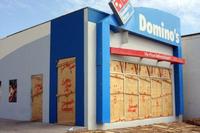Preparedness
Business COOP Planning
Nearly 80% of small business owners do not reopen their doors after a disaster, such as a hurricane, has affected their area of business. However, businesses that prepared and implemented a Continuity of Operations Plan (COOP) were 90% successful in reopening their business immediately after a disaster.
The Chatham Emergency Management Agency (CEMA) wants to ensure that business owners in Chatham County understand how to create an effective and reliable Continuity of Operations Plan (COOP) so to ensure that the capability exists for all businesses to continue essential agency functions across a wide range of hazards.
Does your business have a COOP in place? If not, here's how to get started:
First, all businesses need to understand a COOP's planning objectives. A COOP:
- Ensures continued performance of essential functions.
- Reduces loss of life and minimizes damage.

- Ensures succession to office of key leaders.
- Reduces or mitigates disruptions to operations.
- Protects essential assets.
- Achieves a timely recovery and reconstitution.
- Maintains a test, training, and exercise program for program validation.
Second, there are several critical planning considerations for any COOP plan. COOP's must:
- Be capable of implementation anytime, with and without warning, during duty and non-duty hours.
- Provide full operational capability for essential functions not later than 12 hours after activation.
- Be capable of sustaining operations for up to 30 days. Agencies must develop operating procedures and acquire resources necessary to sustain operations for up to 30 days.
- Include regularly scheduled Training, Testing & Exercises (TT&E). Agencies must train members of their emergency staff and practice COOP procedures to ensure their skills stay current. Equipment and communications must be tested periodically to ensure that they are operable.
Lastly, businesses need to understand the essential elements of a COOP:
- Identify essential functions.
- Delegations of authority.
- Alternate facilities.
- Interoperable communications.
- Vital records and databases.
- Human capital management.
- Tests, training, and exercises.
- Devolution.
- Reconstitution.
- All elements are needed to provide a complete and effective COOP capability.

Elements of a Viable COOP: Essential Functions
Essential functions are those functions that enable an organization to:
- Provide vital services.
- Exercise civil authority.
- Maintain the safety of the general public.
- Sustain the industrial and economic base.
Essential functions are the foundation for COOP programs and plans. For an agency that is at the beginning stage of COOP planning, determining essential functions must be completed before moving on to any other area.
Essential functions are the agency's business functions that must continue with no or minimal disruption. Essential functions are based on the agency's customers and needs. Assigning a priority to the customers' needs helps COOP planners distinguish between essential and nonessential functions.
Essential functions are different for each organization. They depend greatly on the services the agency provides.
Elements of a Viable COOP: Delegations of Authority
Delegations of authority specify who is authorized to make decisions or act on behalf of:
- The department or agency head.
- Other key individuals.
Delegations of authority are used for specific purposes during COOP emergencies. Delegations should be predetermined and documented in writing. They should state explicitly: - What authorities are delegated.
- To whom.
- Exceptions to the successor's authority to re-delegate.
- Limitations on the delegated authority.
Delegations of authority have several purposes, including: - Approving emergency policy changes.
- Approving changes in Standard Operating Procedures (SOPs).
- Empowering designated representatives to participate as members of interagency emergency response teams to act on behalf of the agency head.
- Making personnel management decisions.
- Approving commitment of resources.
- Signing contracts.
There may be legal restrictions on the authorities that can be delegated. To avoid problems during an emergency, all delegations of authority should be reviewed by the agency's legal counsel.
Elements of a Viable COOP: Orders of Succession
Orders of succession are provisions for the assumption of senior agency leadership positions during an emergency when the incumbents are unable or unavailable to execute their duties. They allow for an orderly and predefined transition of leadership.
Orders of succession are different from delegations of authority.
- Delegations of authority are specific and limited. For example, they may take effect during periods when those in charge are unavailable due to travel.
- Successors are vested with most of the authorities and powers of the incumbent.
Orders of succession should be established for the agency head and officials down to office directors responsible for performing essential functions.
Elements of a Viable COOP: Alternate Facilities
Departments and agencies are required to identify locations other than their normal facilities to carry out essential functions in a COOP situation. Selecting a good alternate facility is critical to COOP capability.
Elements of a Viable COOP: Interoperable Communications
One of the resources that the alternate facility must provide is interoperable communications. Interoperable communications are communications that provide the capability to perform essential functions, in conjunction with other agencies and organizations, until normal operations can be resumed.
Interoperable communications mean that personnel must be able to communicate:
- Externally with the organization's customers and business partners.
- Internally with the organization's leadership and coworkers.
- Even if the primary means of communication fails!

Interoperable communications:
- Must support the execution of the agency's essential functions.
- Provide capability to communicate within the organization.
- Provide connectivity to outside agencies and customers.
- Ensure access to data, systems, and services.
The key to interoperable communications is connectivity. Interoperable communications are compatible with communications capabilities used by internal and external organizations.
Elements of a Viable COOP: Vital Records
Vital records are those electronic and hardcopy documents, references, and records needed to support essential functions during a COOP situation. Every business must have a vital records program.
There are two types of vital records:
- Emergency operating records.
- Legal and financial records.
Vital Records: Emergency Operating Records

Emergency operating records include:
- Plans and directives.
- Orders of succession.
- Delegations of authority.
- References for performing essential functions.
Vital Records: Legal and Financial Records
Legal and financial records include:
- Personnel records.
- Social Security records.
- Payroll records.
- Retirement records.
- Insurance records.
- Contract records.
Elements of a Viable COOP: Human Capital Management
Human capital management is the sum of talent, energy, knowledge, and enthusiasm that people invest in their work. Effective human capital management:
- Places the right people in the right jobs to perform the agency's essential functions most effectively.
- Ensures that all employees have a clear understanding of what they are to do in an emergency.
- Includes specific protocols for identifying and assisting special-needs employees.
Employees must be kept informed during emergencies whether they work at the alternate site or not. Poor emergency communications can lead to unnecessary anxiety or indifference in the workforce. Either can drain the agency's ability to perform its COOP mission. Human Capital Management: Non-Emergency Response Group (ERG) Members
All employees need to be informed during the course of an emergency so that they can be ready to go back to work when recalled or to support their agencies' efforts from home.
In a COOP event, most employees will be expected to: - Go home.
- Remain available.
- Wait for further direction.
It is management's responsibility to know where all employees are and how to contact them.
Elements of a Viable COOP: Tests, Training and Exercises
Tests, training and exercises (TT&E) include measures to ensure that an agency's COOP program is capable of supporting the continued execution of its essential functions throughout COOP operations.
TT&E is a significant part of a viable COOP capability. Through TT&E, agencies can ensure that:
- All equipment and systems work as required.
- Employees are able to deploy to the alternate facility within the required timeframe.
- The alternate facility includes everything that is needed for the response team to perform the agency's essential functions.
- TT&E Program Goals
- The goals of a progressive TT&E program are to:
- Train ERG members in functional areas of mission readiness.
- Provide opportunities to acquire skills and knowledge required to perform assigned ERG roles.
- Build team unity.
- Reflect lessons learned from TT&E events, current COOP information and training needs.
Elements of a Viable COOP: Devolution
Devolution is the capability to transfer statutory authority and responsibility for essential functions from an agency's primary operating staff and facilities to other employees and facilities. It is also the ability to sustain that operational capability for an extended period.
Devolution is a way of ensuring a COOP capability in the event COOP personnel are unable to perform their mission or if the alternate facility is unavailable to support it.
As part of COOP planning, agencies should:
- Identify likely triggers for devolution.
- Describe how and when devolution will occur.
- Identify the resources that will be required to continue essential functions under a devolution scenario.
 ]
]
Elements of a Viable COOP: Reconstitution
Reconstitution is the process by which agency personnel resume normal agency operations from the original or a replacement primary operating facility. Agencies must identify and outline a plan to return to normal operations. Reconstitution is complex. Agencies should appoint a Reconstitution Manager to handle the reconstitution process.
